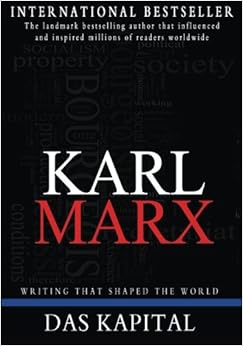
Free Das Kapital: A Critque Of Political Economy Ebooks To Download

One of the most notorious works of modern times, as well as one of the most influential, "Capital" is an incisive critique of private property and the social relations it generates. Living in exile in England, where this work was largely written, Marx drew on a wide-ranging knowledge of its society to support his analysis and generate fresh insights. Arguing that capitalism would create an ever-increasing division in wealth and welfare, he predicted its abolition and replacement by a system with common ownership of the means of production. "Capital" rapidly acquired readership among the leaders of social democratic parties, particularly in Russia and Germany, and ultimately throughout the world, to become a work described by Marx's friend and collaborator Friedrich Engels as 'the Bible of the Working Class'.

Paperback: 200 pages
Publisher: CreateSpace Independent Publishing Platform; 1/31/11 edition (March 2, 2011)
Language: English
ISBN-10: 145388632X
ISBN-13: 978-1453886328
Product Dimensions: 7 x 0.5 x 10 inches
Shipping Weight: 1 pounds (View shipping rates and policies)
Average Customer Review: 3.7 out of 5 stars See all reviews (81 customer reviews)
Best Sellers Rank: #104,344 in Books (See Top 100 in Books) #111 in Books > Politics & Social Sciences > Politics & Government > Ideologies & Doctrines > Communism & Socialism #145 in Books > Politics & Social Sciences > Politics & Government > Specific Topics > Political Economy #172 in Books > Business & Money > Economics > Theory

When historians look at the impact that Das Kapital has had on world events, they tend to place it in a literary continuum that began with his Critique of Hegel's Philosophy of Right (1843), followed by Economic and Philosophic Manuscripts of 1844, The German Ideology (1846), The Communist Manifesto (1848), Grundrisse (1857), "Theses on Feuerbach" (1886), and Das Kapital (Volume I, 1867, Volumes II/III, 1893-1894). What they share is the belief that history is a forward moving phenomenon with one stage leading predictably to the next. Further, Marx saw only a very limited number of stages. The first stage was the primitive hunter-gatherer one of the Paleolithic. The second was the centering of clans into tribes and tribes into small cities and small cities into larger ones and ultimately into empires. The third was the feudal system following the dissolution of the Roman Empire. The fourth was the mercantile/capitalist system that began with the gradual breakup of feudalism beginning in the sixteenth century. According to Marx, when he wrote Das Kapital, humanity was in the Last Days of capitalism. Looming inevitably in the near future was the coming revolution of the proletariat that would usher in a workers' paradise of a classless society. Where Marx differs from his predecessors (most notably Hegel) was how and why the current capitalist system would soon enough vanish. Hegel used the dialectic of ideas to nail down his thesis that the future of mankind lay in the gradual maturation of a Spirit that would infuse man with the driving force for change. Marx agreed with Hegel concerning the need for a driving impetus but disagreed about this impetus. Marx envisioned a world of a constantly evolving materialism that forced human beings to remain in eternal conflict.
Das Kapital: A Critque of Political Economy Karl Marx: Das Kapital Political Theology: Four New Chapters on the Concept of Sovereignty (Columbia Studies in Political Thought / Political History) Rousseau: The Basic Political Writings: Discourse on the Sciences and the Arts, Discourse on the Origin of Inequality, Discourse on Political Economy, ... Contract, The State of War (Hackett Classics) The Political Life of Medicare (American Politics and Political Economy) Political Transformations and Public Finances (Political Economy of Institutions and Decisions) The Early Political Writings of the German Romantics (Cambridge Texts in the History of Political Thought) The History of Islamic Political Thought, Second Edition: The History of Islamic Political Thought: From the Prophet to the Present Political Order and Political Decay: From the Industrial Revolution to the Globalization of Democracy Capital: Volume 1: A Critique of Political Economy (Penguin Classics) Money and the Nation State: The Financial Revolution, Government, and the World Monetary System (Independent Studies in Political Economy) Introduction to International Political Economy Rape Loot Pillage: The Political Economy of Sexual Violence in Armed Conflict (Oxford Studies in Gender and International Relations) Global Political Economy: Understanding the International Economic Order International Political Economy International Political Economy: Perspectives on Global Power and Wealth (Fifth Edition) Global Political Economy: Theory and Practice The Currency of Ideas: Monetary Politics in European Union (Cornell Studies in Political Economy) Government and Business: American Political Economy in Comparative Perspective Tango And The Political Economy Of Passion (Institutional Structures of Feeling)



